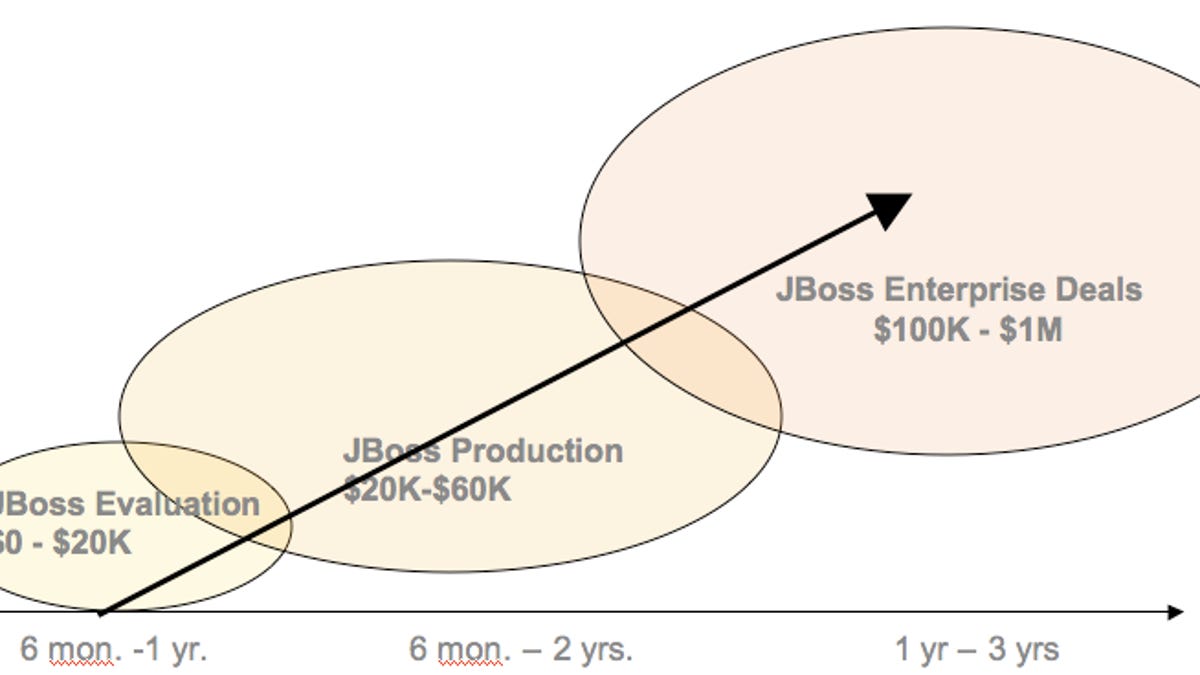The secrets of JBoss' success, Part III (Or, how to build an open-source company)
Open source is all about data, as JBoss' success demonstrates.

I've written before on the remarkable JBoss revenue machine. As I learn more about its operations, the more impressed I become.
First off, for those who think that open source is a high-volume, low-ASP (Average Sales Price) game, you've obviously never worked for an open-source company. At least, not long enough. To the right you can see JBoss' ASP/Average Deal Size over time*, which maps very closely to my direct, personal experience with Alfresco and the other open-source companies I advise.
This graphic shows JBoss moving from isolated, departmental implementations (low dollars) to company-wide deployments (big dollars). This is the natural progression for any successful commercial open-source project. Invade the enterprise through free downloads and let the positive experience percolate throughout an enterprise until the CIO pushes a site-wide license.
You know you've won the "JBoss mindshare contest" when the chief architect/CTO of an enterprise, rather than a lower-level employee, starts making contact with the vendor. This is now standard for JBoss. But it all starts with the developer - it is the individual developer who gave JBoss the first opportunity within the enterprise. Smart open-source companies continue to feed this developer community even as their profile rises with CxO-level IT executives.
This means building a compelling website. JBoss used its website as its primary marketing channel. (SugarCRM and others have followed suit. SugarCRM has actually moved beyond what JBoss did with its site, to very positive effect.) At its highest point in 2005-06, JBoss had 62,000+ raw leads from its website (10,000 - 16,000/month, on average). 84% of the company's leads came from its website. Think about that for a few seconds and it becomes clear why giving away one's software and making one's company (roadmap, documentation, etc.) transparent is such a good idea.
JBoss' incredible lead generation led to 7,000+ qualified leads each quarter. For reference, "qualified leads" fall into five categories. They include those who:
- Directly contact the company (email or phone) asking for someone to contact them back;
- Fill out a 'contact me' form on a JBoss.com page;
- Attend a training course;
- Show significant interest at an event; and/or
- Meet website activity criteria, including hitting >2 service pages or >2 partner pages, or download select PDFs
This means that JBoss could hire "inside" sales people: people who spent most of their time on the phone or email, answering incoming leads rather than scouring the planet for people who would consider buying from JBoss. I believe this completely turns the definitions of field sales and inside sales on their heads. Within an open-source company, at least to a certain level of maturity (Three to four years into the company's sales when there is sufficient brand to justify proactive sales), there is little need for someone to be boarding a plane each week to hawk products.
In fact, the ex-JBoss people who work with me tell me that they were expected to spend at least three weeks "inside," with travel in the last week as necessary. Needless to say, it wasn't often necessary. Not when the software sells itself.
There is much more to the JBoss sales machine than I have space or inclination to write here. (For instance, marketing automation software like Eloqua and Loopfuse is critical to any open-source company. Period. If you're not using it, your investors are squandering their investment.) You get the picture.
Open-source companies are long-term businesses that harness the fruits of transparency to capture leads and sell value. Open source depends on effective monetization of Internet traffic, be that website hits, downloads, documentation views, etc.
But, truly, it depends on exceptional software engineering. Without that foundation, no amount of web analytics or sexy business model will save an open-source company. The code doesn't lie.
*Data comes from a JBoss presentation I secured some time ago. No, I didn't get it from a current or past JBoss employee.
Disclosure: I serve on the advisory boards of SugarCRM and Loopfuse. I am an employee of Alfresco, an open-source content management company.